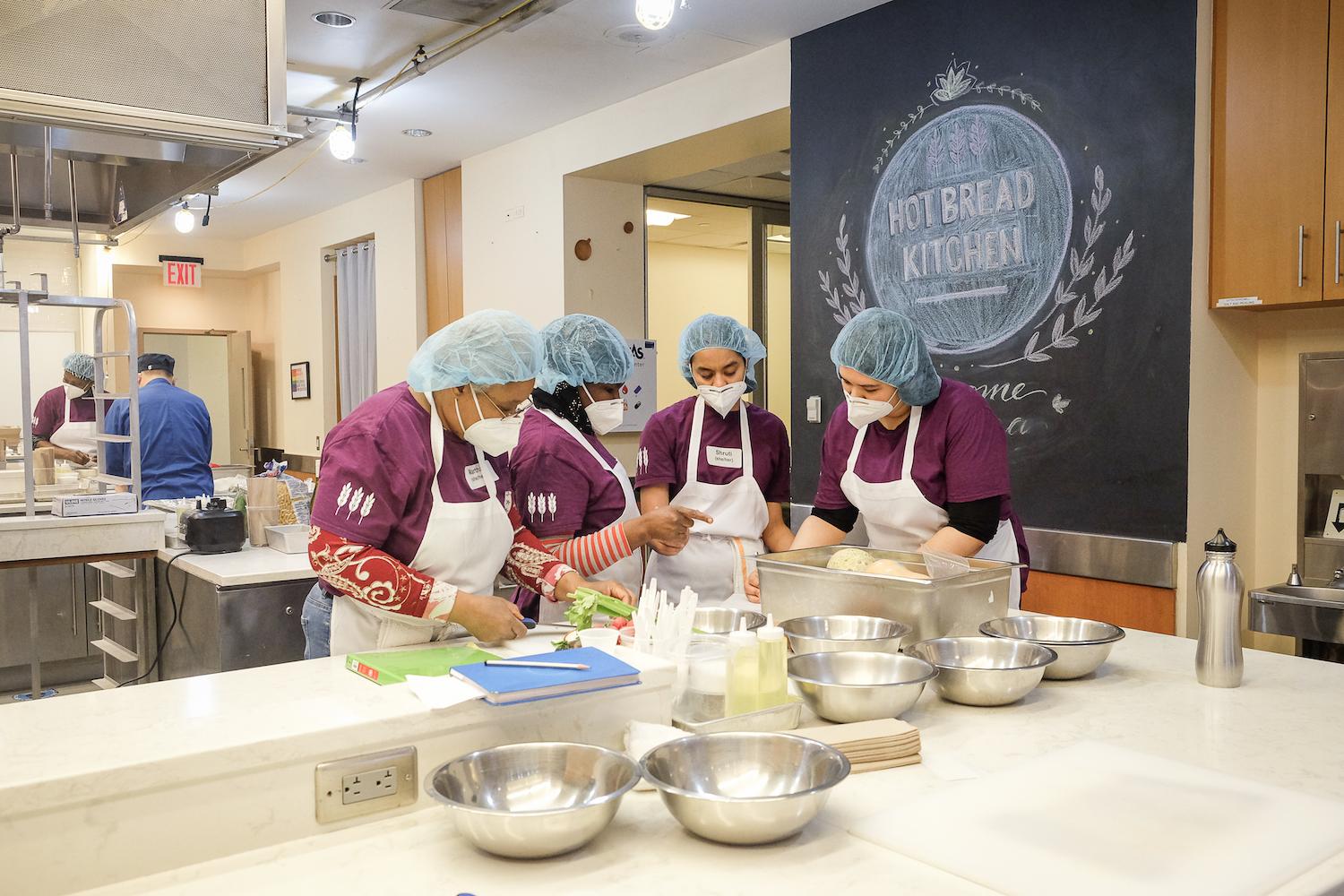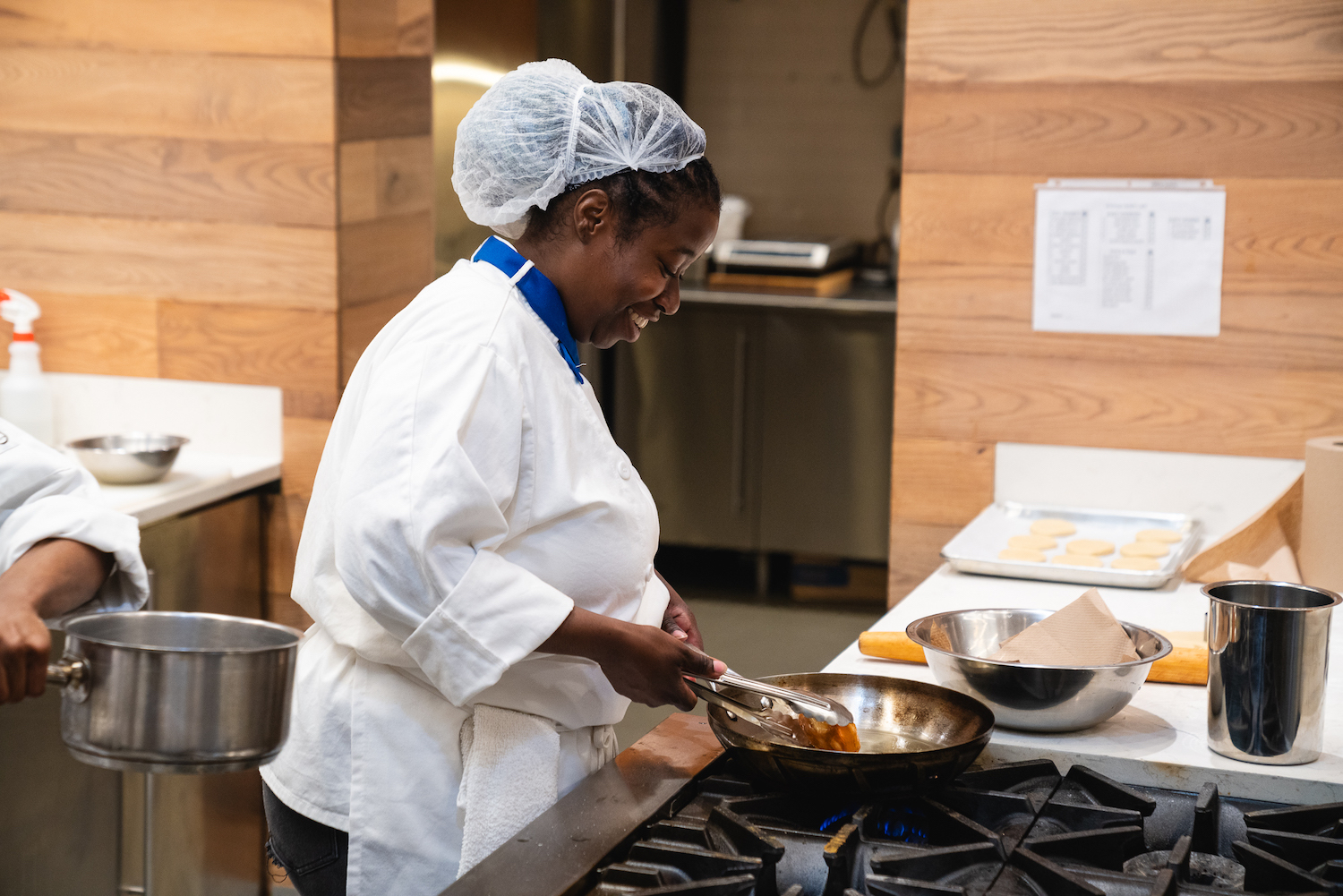
Hot Bread Kitchen is a New York City-based nonprofit organization that creates economic opportunity for immigrant women and people of color with training and job placement in the food industry. (Image courtesy of Hot Bread Kitchen)
When we look at what it takes to be successful in the workplace — and what makes a workplace successful — it becomes immediately apparent that workers need agency over their choices, goals and actions. It’s also clear that women and people who identify beyond the gender binary are systematically denied agency in the workplace — as in, the opportunity to make decisions, take purposeful action and pursue goals.
The COVID-19 pandemic highlighted myriad barriers to women’s agency in the workplace, attributable to outdated societal gender norms. In the first months of the pandemic in the United States, women’s employment fell precipitously in comparison to men. The reason? Women still tend to be more likely than men to leave their jobs or downsize their positions to take care of children and/or elderly family members when the need arises.
For those that remain in the workforce, factors limiting the agency of women and gender-expansive people abound. Women’s agency is hindered because they are more likely to fill service-industry jobs that tend to offer limited flexibility or benefits, and women with lower educational attainment are hit the hardest.
Transgender and gender-expansive people face workplace barriers due to being generally underrepresented in the U.S. workforce, and consistently enduring threats of violence, discrimination and stigma. Lack of guaranteed healthcare or paid leave, limited access to childcare, inflexible schedules, fewer opportunities to build knowledge and skills, and much more intersect to limit women and trans people’s freedom to pursue their professional goals.
This shift toward lower workforce participation among women and trans people — and the increased gender inequality that follows — has lasting implications for the future options and decision-making of workers, not to mention for younger generations. Further, lack of workforce diversity is both a result of, and leads to, lack of leadership diversity, further entrenching these conditions.
Mindful of lessons learned from the pandemic, and with the knowledge that women and gender-expansive people are critical to business’ success, we are more aware than ever that organizations and workers excel when they are led with wisdom and compassion. When ranked by their employees, 55 percent of women leaders were perceived to have these two critical traits, versus 27 percent of men. The point is not that women are necessarily better leaders, but rather that they tend to embrace leadership practices that foster more inclusive work environments for everyone, which in turn creates a bulwark against the trends listed above.
The existing gender gap in workplace leadership has real ramifications for the bottom line and for our culture. When various industries’ current leaders (who, generally speaking, tend to be men) continue to take a “traditional” approach to leadership and company policies — one that favors business-as-usual over humanity and equity — it further entrenches norms that exclude women and gender-nonconforming people from leadership positions, diminishes overall productivity, and has larger implications for generational wealth. And, as we saw in the early days of the pandemic, these approaches can push women out of the workforce entirely and limit agency for the longer term.
By embracing an approach focused on wisdom and compassion, employers — from major corporations to local nonprofit organizations — can play an important role in advocating for women’s and gender-expansive people’s agency and success in the workforce and beyond, ensuring all workers have the resources they need to excel at work and at home.

How Hot Bread Kitchen supports empowered workers
This is where Hot Bread Kitchen comes in. Hot Bread Kitchen is a New York City-based nonprofit organization that creates economic opportunity for immigrant women and people of color using the vibrant food industry as a catalyst for personal and professional growth.
We support our program members — who are disproportionately affected by social and economic barriers to wealth generation and long-term stability — as they pursue their career ambitions. We support women and gender-expansive people by providing culinary skills training and professional readiness programs, job placement, food business entrepreneurship assistance, social services support, bridge training, an extensive employer network, and more.
In the years since our founding, it has become clear that these strategies are critical tools for advancing women’s ability to find and sustain employment, grow in their careers, make choices for their families, and achieve their goals.
This holistic approach has been an evolving aspect of Hot Bread Kitchen’s model. When our organization started in 2008, we were a bakery with a simple, but important, mission: teach women bakery skills and connect them with food industry employers to secure jobs. Many other workforce development programs still drive toward a similar goal today: get people who are looking for work in the door, give them relevant skills training, and connect them with a job.
While there’s no arguing that this is an important objective, working side-by-side with our participants over the years has evolved our understanding of what it means to ensure women’s agency, a thriving career, or a meaningful public life. At Hot Bread Kitchen, we learned that for our members to be successful in the long run, we needed to do more — to take an approach that supports the whole person, not just the worker.
Empowering women to succeed in the workplace demands a comprehensive approach to overcoming obstacles, both at work and beyond. But what exactly does this look like, and what can you do to help?
The next piece in this two-part article series dives deeper into Hot Bread Kitchen’s approach, the essential role of corporate partners, such as Yelp, and how individuals can drive change. Click here to read it.

Leslie Abbey, Esq. (she/her) is an organizational leader and entrepreneur who has committed her career to supporting families and youth, social justice, and data-driven strategies to improve social service outcomes. As Hot Bread Kitchen’s CEO, Leslie is overseeing execution of the organization’s three-year plan to support 1,000 breadwinners across New York City and expand its programs to all five boroughs. Prior to joining Hot Bread Kitchen, past experiences include: Deputy Executive Director and Chief Operating Officer of Covenant House New York, Chief Program Officer at Lantern Community Services, and positions with New York City Administration for Children’s Services (ACS). A critical thinker with a passion for building programs that improve social service outcomes and the experience of users of public systems, Leslie is also a founder of two nonprofit organizations: Family Legal Care (formerly LIFT) and Anthos|Home.
Miriam Warren is the Chief Diversity Officer at Yelp and Board Chair of the Yelp Foundation. She joined Yelp in 2007, serving in a variety of marketing and operational roles, including leading the company’s expansion efforts internationally as Vice President of New Markets. Presently, Miriam heads a team working at the intersection of culture, employee engagement, social impact and diversity, equity, inclusion, and belonging.














